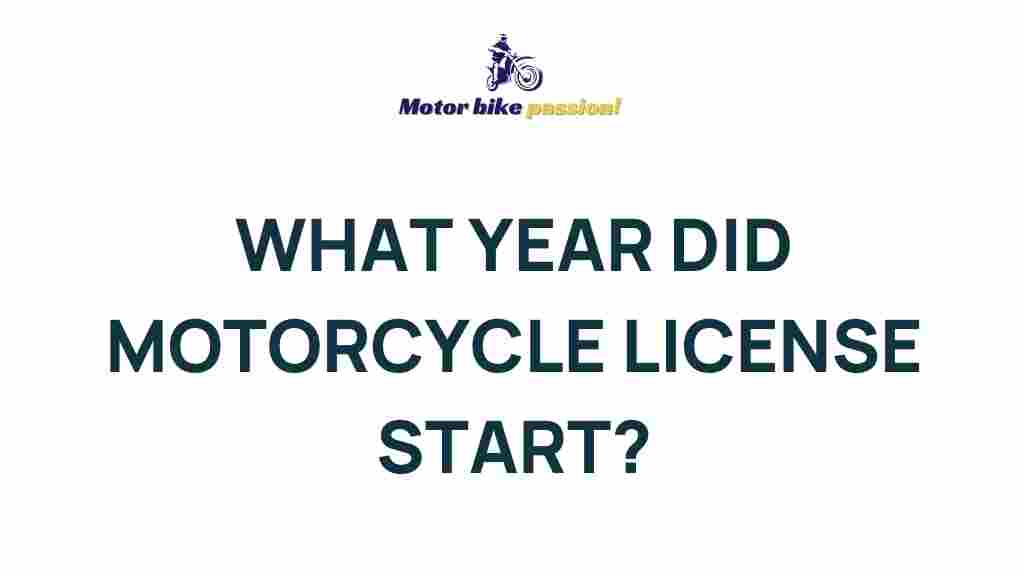Uncovering the Origins of Motorcycle Licensing
Motorcycles have long been a symbol of freedom and adventure on the open road. However, like any other motor vehicle, they come with a set of legal requirements that riders must adhere to. Understanding the history and regulations surrounding motorcycle licenses is crucial for both new and experienced riders. In this article, we will explore the development of motorcycle licensing, its legal implications, and the requirements for registration.
The Early Beginnings of Motorcycle Licensing
The history of motorcycle licensing can be traced back to the early 20th century, shortly after motorcycles became popular. As the number of motorbikes on the road increased, so did the need for regulations to ensure safety and responsible riding. Here are some key milestones in the development of motorcycle licensing:
- 1903: The Motor Car Act in the UK introduced the concept of vehicle registration and driver licensing.
- 1913: The first motorcycle-specific licenses were issued in the United States, with states beginning to establish their licensing requirements.
- 1930s: Many countries began to implement more standardized testing protocols for motorcycle riders.
Understanding Motorcycle License Regulations
As motorcycles evolved, so did the regulations governing their use. Licensing requirements vary significantly from one jurisdiction to another, but they generally include:
- Age restrictions: Most places require riders to be a certain age before they can obtain a motorcycle license.
- Testing: Riders typically must pass both a written test and a practical riding test to demonstrate their knowledge of motorcycle operation and safety.
- Training courses: Many regions encourage or require riders to complete a motorcycle safety course before obtaining a license.
These regulations aim to ensure that motorcycle riders possess the necessary skills and knowledge to operate their vehicles safely on public roads.
The Legal Importance of Motorcycle Registration
Registration is another critical component of motorcycle ownership. In many areas, you cannot legally operate a motorcycle on public roads without proper registration. Here are some reasons why registration is essential:
- Legal compliance: Riding an unregistered motorcycle can lead to fines and penalties.
- Identification: Registration helps law enforcement track stolen motorcycles and identify owners.
- Liability: Registered motorcycles often come with insurance requirements, protecting riders in case of accidents.
To register a motorcycle, you typically need to provide proof of ownership, proof of insurance, and pay a registration fee. The requirements may vary by state or country, so it’s essential to check local regulations.
Motorcycle License Requirements: A Step-by-Step Guide
Obtaining a motorcycle license involves several steps. Below is a general guide to help you navigate the process:
- Check Eligibility: Ensure you meet the age and residency requirements for your area.
- Gather Documentation: Collect necessary documents, including identification, proof of residency, and any prior licenses.
- Complete a Training Course: Enroll in an accredited motorcycle safety or training course. Completing this may sometimes reduce the testing requirements.
- Pass the Written Test: Study your local motorcycle laws and take the written exam.
- Pass the Practical Test: Demonstrate your riding skills in a practical examination.
- Pay Fees: Be prepared to pay for the license and any training or testing fees.
- Receive Your License: Once you pass all tests and pay the necessary fees, you will receive your motorcycle license.
Following these steps will help ensure that you are legally able to ride your motorcycle and understand the responsibilities that come with it.
Troubleshooting Common Licensing Issues
While the process of obtaining a motorcycle license is relatively straightforward, riders may encounter some common issues. Here are a few troubleshooting tips:
- Failed Tests: If you fail the written or practical tests, review the material and consider additional training before retaking the exam.
- Missing Documents: Ensure you have all required documents before heading to the licensing office. This may include proof of residency or identification.
- Fees and Payments: Double-check the accepted payment methods for fees, as some offices may not accept credit cards.
- Address Changes: If you move, make sure to update your registration and license information as required by law.
By being prepared and informed, you can avoid common pitfalls that may delay your motorcycle licensing process.
The Evolution of Motorcycle Regulations
As motorcycle technology has advanced, so have the regulations governing their use. The introduction of electric motorcycles, for instance, has led to new discussions about licensing and registration. Here’s a snapshot of how motorcycle regulations have evolved:
- Safety Standards: Over the years, governments have implemented stricter safety standards for motorcycles, including helmet laws and mandatory safety gear regulations.
- Environmental Regulations: With the rise of electric motorbikes, regulations are evolving to address environmental concerns and emissions standards.
- Insurance Requirements: Many jurisdictions now require proof of insurance before a motorcycle can be registered or operated on public roads.
The evolution of these regulations reflects changing societal values and advancements in technology, ensuring that motorcycle use remains safe and responsible.
Conclusion: The Future of Motorcycle Licensing
Understanding the history and development of motorcycle licensing is essential for all riders. As regulations continue to evolve with advancements in technology and changing societal attitudes, staying informed is key. Whether you’re a novice or a seasoned rider, knowing the legal requirements and safety regulations will enhance your riding experience and help you enjoy the freedom of the open road safely.
For more detailed information about motorcycle licensing in your area, consider visiting your local Department of Motor Vehicles (DMV) or equivalent authority. You can also find resources and communities online to help you stay updated on the latest regulations and best practices for motorcycle riding. For additional guidance, check out this helpful resource.
By embracing the history and regulations surrounding motorcycle licensing, you can contribute to a safer riding environment for everyone on the road. Happy riding!
This article is in the category Basic Guides and created by MotorBikePassion Team
